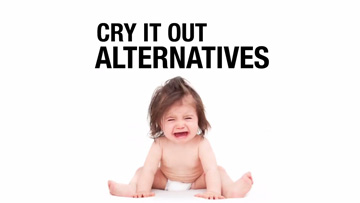Why Sleep Training Can Be Bad for Your Baby
- This is a dreadful idea of allowing kids to cry themselves to sleep. This was completely uninformed, this idea, this advice by what children truly need and how development works. When children cry, whether it's distress or tears of futility or upset, they need to cry in the comfort of those who are responsible for them. The fact is is it can produce sleep just like it does in the neonate nursery in the hospital, but that's because of defendedness. The most difficult thing for a child to face is separation and when we say okay I'm not gonna talk to you anymore, I'm closing the door, that's it, we push a child's face into separation and it alarms them and it can call forth defendedness that can actually put them to sleep out of defense, but this is not a place where children need to go to sleep from. They need to go to sleep from a place where they relax, where all is well just like we do and there's two things that are most important here in terms of sleep and if you get sleep right as a parent, it's a prototype of all kinds of other experiences. Now, there's two things that are most significant. There's one that you want to create a continuity of connection, you want to be able to answer their needs to be in contact with you at all times. So if they can't see you, then maybe they can hear you. If they can't hear you, maybe they can smell you and you can put your nighty around them or next to them. In some way, they need to have that sense of contact. The ultimate answer developmentally is their attachment grows deeper so that they can hold on to you when physically apart. They're connected at the heart. They're connected through sameness. This is the ultimate answer, so we need to be patient. Children will grow out of this and the other thing is is that we mustn't put their eyes and their attention on separation. We must be put their eyes on the next connection and this is the key to all sleep issues and so you always put the connection on the next point of contact. I'll see you in my dreams. If children can't handle even the tiniest little bit, we got the egg timer out. Before the egg timer is out, mommy will be back, daddy will be back, I have another hug in me for you. But it's always putting the focus on the connection and the next connection that's coming. Gradually the child can do this by looking forward to getting up in the morning with you. I've got a special treat planned or if you do say I'll see you in my dreams, make sure when they ask you in the morning that you have a wonderful dream to tell them of connection and so on. But soon when a child gets used to the fact that sleep means that they're going into connection, they can hardly wait to go to sleep. It gets better when they go to sleep rather than worse. But if you can solve this problem, the sleep problem, you're set up to solve all kinds of problems in childhood because the key is you put their focus on the next connection, you bridge the separation rather than put their attention into separation.
Gordon Neufeld, PhD Psychologist and Author, explains why kids should not be allowed to cry themselves to sleep, and shares a few alternatives that will help them fall asleep, and create a strong connection with their parents.
Related Videos
Transcript
Expert Bio
More from Expert
Gordon Neufeld, PhDPsychologist & Author
Dr. Gordon Neufeld is a Vancouver-based developmental psychologist with over 40 years of experience with children and youth and those responsible for them. A foremost authority on child development, Dr. Neufeld is an international speaker, a bestselling author, Hold On to Your Kids and a leading interpreter of the developmental paradigm. Dr. Neufeld has a widespread reputation for making sense of complex problems and for opening doors for change. While formerly involved in university teaching and private practice, he now devotes his time to teaching and training others, including educators and helping professionals. His Neufeld Institute is now a worldwide organization devoted to applying developmental science to the task of raising children. Dr. Neufeld appears regularly on radio and television. He is a father of five and a grandfather of three.




 GET ACCESS TO ALL PREMIUM CONTENT WITH NO ADS FOR $4.99/MONTH
GET ACCESS TO ALL PREMIUM CONTENT WITH NO ADS FOR $4.99/MONTH




Login or Register to view and post comments